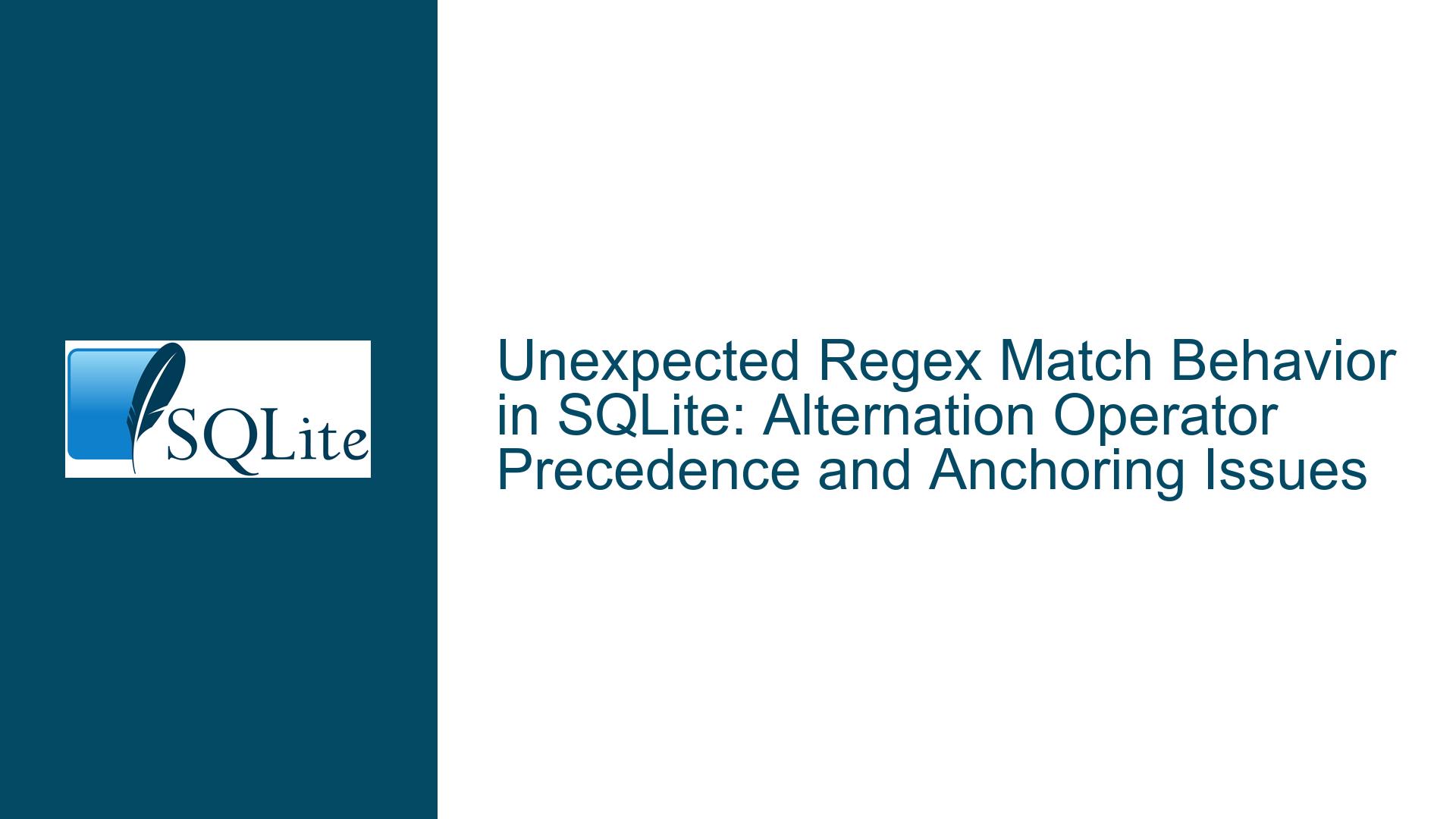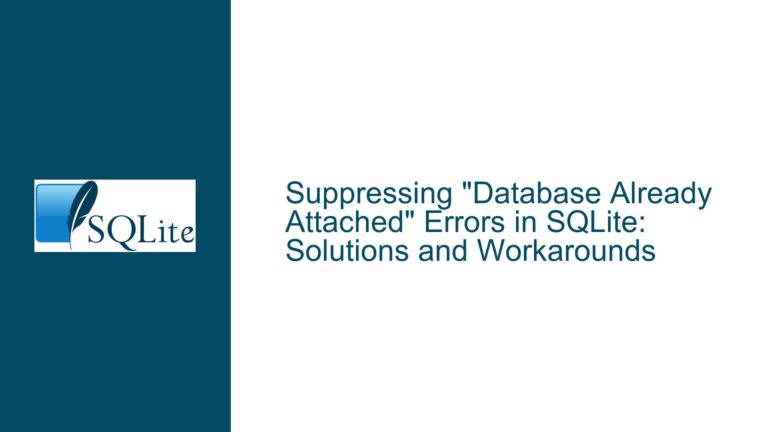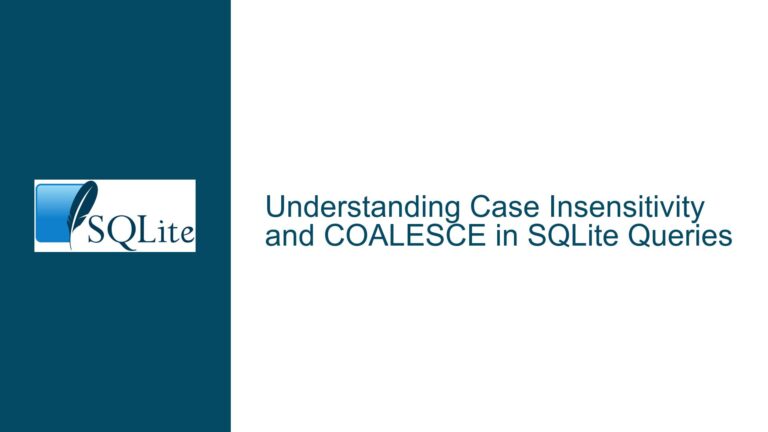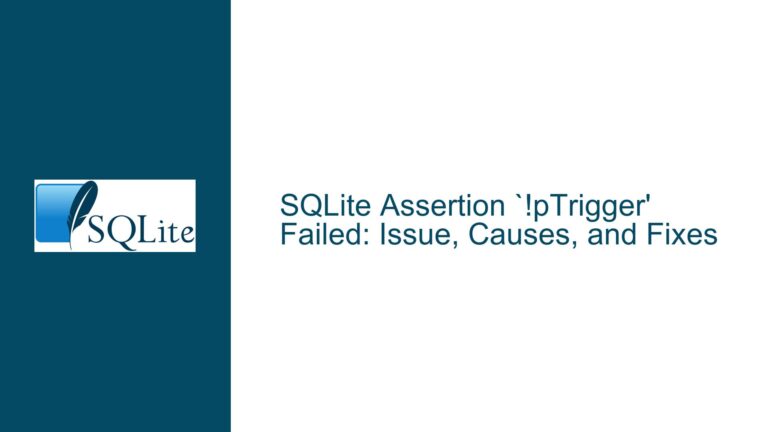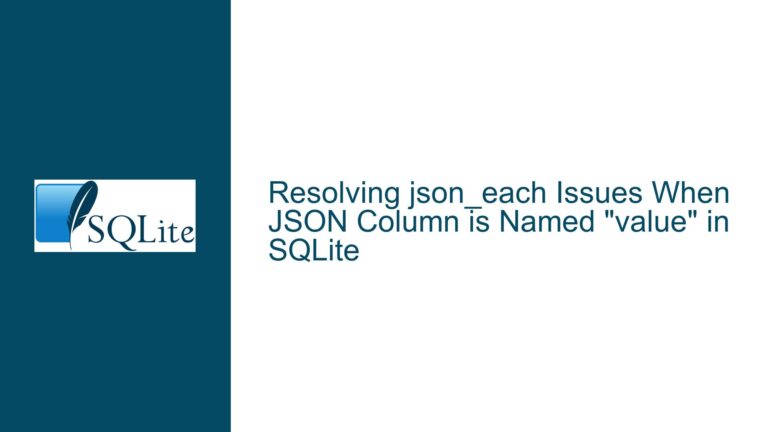Unexpected Regex Match Behavior in SQLite: Alternation Operator Precedence and Anchoring Issues
Regex Anchoring Mismatch Due to Alternation Operator Precedence in SQLite
Issue Overview: Regex Alternation Splits Anchored Patterns Unintentionally
The core issue revolves around unexpected matches when using regular expressions in SQLite to validate integer literals (decimal or hexadecimal) with optional leading signs. Two similar regex patterns yield different results when applied to the string '1 + 2':
-- Pattern 1: Returns 1 (match)
SELECT REGEXP('^[-+]?(\d+)|(0[xX][0-9a-fA-F]+)$', '1 + 2');
-- Pattern 2: Returns 0 (no match)
SELECT REGEXP('^[-+]?((\d+)|(0[xX][0-9a-fA-F]+))$', '1 + 2');
The only difference is the presence of an extra grouping in the second pattern. The first regex matches despite '1 + 2' not being a valid integer literal, while the second correctly rejects it. This discrepancy arises from operator precedence rules governing regex alternation (|) and anchoring (^, $).
Key observations:
- Anchoring Behavior: The
^and$symbols bind to their immediately adjacent regex elements, not to the entire alternation branch. - Alternation Precedence: The
|operator has lower precedence than sequence concatenation, causing the regex engine to split the pattern into two independent branches:- Branch 1:
^[-+]?(\d+) - Branch 2:
(0[xX][0-9a-fA-F]+)$
- Branch 1:
- Partial Matches: The first branch matches the initial
1in'1 + 2'because the regex engine stops at the first valid match and ignores the rest of the string.
This violates the intended logic of requiring the entire string to conform to either a decimal or hexadecimal integer format. The second regex fixes this by grouping the alternation, forcing the anchors to apply to the entire pattern.
Possible Causes: Regex Engine Parsing Rules and SQLite Implementation Nuances
1. Operator Precedence Misinterpretation
Regex engines parse patterns according to operator precedence rules:
- Highest: Quantifiers (
?,*,+,{n,m}) - Middle: Sequence concatenation (implicit)
- Lowest: Alternation (
|)
In Pattern 1 (^[-+]?(\d+)|...$), the alternation splits the regex into two independent branches:
^[-+]?(\d+)matches any string starting with an optional sign followed by digits.(0[xX][0-9a-fA-F]+)$matches any string ending with a hexadecimal literal.
The engine treats these as separate alternatives, allowing partial matches. This contradicts the developer’s expectation that anchors (^/$) would apply to the entire expression.
2. Regex Engine Variants in SQLite
SQLite’s regex behavior depends on the extension used:
- Default
REGEXPOperator: Uses a minimal regex implementation (often similar to POSIX Extended Regular Expressions). - ICU Extension: Implements Unicode-aware regex with stricter anchoring (requires full-string matches by default).
The observed behavior matches the default SQLite regex engine, which:
- Does not implicitly anchor patterns (unlike ICU).
- Allows partial matches unless explicitly anchored.
3. Hex Literal Parsing Ambiguity
Hexadecimal literals in SQLite require a 0x/0X prefix but no sign. Pattern 1’s second branch (0[xX][0-9a-fA-F]+$) fails to account for optional signs, creating an inconsistency:
- Decimal literals may have signs.
- Hex literals may not, per SQLite syntax rules.
This oversight complicates validation logic but isn’t the root cause of the anchoring issue.
Troubleshooting Steps, Solutions & Fixes: Enforcing Full-String Validation
Step 1: Diagnose Anchoring Scope with Regex Structure Analysis
Problematic Pattern:
^[-+]?(\d+)|(0[xX][0-9a-fA-F]+)$
Parsing Breakdown:
Branch 1: ^[-+]?(\d+)
│ │
│ └─ Matches "1" in "1 + 2"
└─ Anchor applies only to this branch
Branch 2: (0[xX][0-9a-fA-F]+)$
│ │
└──┴─ Anchor applies only to this branch
Solution:
Group the alternation to bind anchors to the entire expression:
^[-+]?((\d+)|(0[xX][0-9a-fA-F]+))$
Parsing Breakdown:
Entire Pattern: ^...$
│ │
└────┴─ Anchors apply to entire expression
Subgroups: ((\d+)|(0[xX][0-9a-fA-F]+))
│ │
│ └─ Hex literal
└─ Decimal literal
Step 2: Validate Against SQLite’s Regex Engine Quirks
Test Cases:
-- Case 1: Valid decimal
SELECT REGEXP('^[-+]?((\d+)|(0[xX][0-9a-fA-F]+))$', '+123') → 1
-- Case 2: Valid hex
SELECT REGEXP('^[-+]?((\d+)|(0[xX][0-9a-fA-F]+))$', '0X1F') → 1
-- Case 3: Invalid (mixed content)
SELECT REGEXP('^[-+]?((\d+)|(0[xX][0-9a-fA-F]+))$', '1 + 2') → 0
-- Case 4: Invalid signed hex
SELECT REGEXP('^[-+]?((\d+)|(0[xX][0-9a-fA-F]+))$', '-0x1A') → 0
ICU Extension Validation:
-- Load ICU extension
.load libicu
-- Test with ICU (implicit full-string matching)
SELECT ICU_REGEXP('^[-+]?(\d+)|(0[xX][0-9a-fA-F]+)$', '1 + 2') → 0
Step 3: Refine Regex for SQLite Integer Literal Syntax
SQLite Integer Literal Rules:
- Decimal: Optional sign, digits only.
- Hexadecimal:
0x/0Xprefix, no sign.
Final Optimized Pattern:
^([-+]?\d+|0[xX][0-9a-fA-F]+)$
Breakdown:
[-+]?\d+: Signed or unsigned decimal.0[xX][0-9a-fA-F]+: Unsigned hexadecimal.- No redundant groupings.
Step 4: Address Cross-Engine Regex Compatibility
Behavior Comparison:
| Engine | Partial Matches Allowed? | Anchoring Required? |
|---|---|---|
| SQLite (Default) | Yes | No |
| ICU | No | Yes |
Python re | Yes (unless fullmatch) | No |
Mitigation Strategies:
- Explicit Anchoring: Always include
^and$unless partial matches are intended. - Engine-Specific Testing: Validate regex patterns against the target engine.
- Documentation Checks: Review SQLite’s regex implementation notes for edge cases.
Final Implementation:
-- Validate integer literals in SQLite
CREATE TABLE test (val TEXT);
INSERT INTO test VALUES ('+123'), ('0X1F'), ('1 + 2'), ('-0x1A');
SELECT val,
val REGEXP '^([-+]?\d+|0[xX][0-9a-fA-F]+)$' AS is_valid
FROM test;
Output:
+-------+----------+
| val | is_valid |
+-------+----------+
| +123 | 1 |
| 0X1F | 1 |
| 1 + 2 | 0 |
| -0x1A | 0 |
+-------+----------+
This approach ensures strict validation of SQLite integer literals while accounting for regex engine idiosyncrasies.
